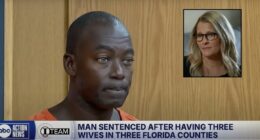
Flagler County government still doesn’t think the owners of the ruin known as the Old Dixie motel are admirable people by any stretch. But the Flagler County Planning Board on Tuesday finally approved on a 6-1 vote the owners’ site plan for a refurbished “Henry Hotel.” The vote does not end the county’s three-year-old legal dispute with the owners nor does it scrap the county’s pending order to demolish the motel–unless construction begins swiftly and proceeds earnestly.
Assistant County Attorney Sean Moylan asked the board to evaluate the site plan only as a site plan–not as a special exception where the board could impose conditions (it imposed one anyway: a fence), and not as an application open to “extraneous” issues related to the owners’ poor history with the county. He also told them to ignore Circuit Judge Chris France’s recent order to the owners to produce reams of financial information as the county continues to pressure them to pay a $250,000 performance bond they have refused to pay for three years.
None of that matters as far as the site plan is concerned, Moylan said.
“I understand the comments of the board at that last meeting, because the behavior of this group has been, well, let’s just say, not good,” Moyland said. “They’ve brazenly defied the court’s order. They immediately breached their contract with the county as soon as they had an opportunity to do so. There’s nothing admirable of their behavior. But that has nothing to do with a site plan. They have every right to come before you and to ask for a site plan to be approved, and if you are to muddy the waters with those extraneous items, it will be very difficult for me to defend that decision in court, and it will potentially have implications on the pending lawsuit already in court.”
Once board members established that they would be hindering rather than helping the county’s case against the owners if they caused more delays or raised more objections, they went ahead with the approval. They did so with a few more assurances from the owners’ representatives, tying up loose ends from when the site plan was first before the board last month.
The hotel owners’ representatives are pledging that light from the property will not be projected onto adjoining properties. (The owners themselves, as always, were invisible at the Planning Board meeting.) They added parking for the disabled. Two utility access easements were in question last month. The easements near the entrance to the Holiday Travel Park had not been recorded. That has since been done. “If you approve it, we’re intending to hold them to the plan that’s been submitted,” Adam Mengel, the county’s planning director, said.
Dennis Bayer, the Flagler Beach attorney who is representing the hotel owners in some respects, disputed some of Moylan’s characterizations. “What you’re going to determine tonight is actually the end of the agreement that my clients reached with the county way back before they took possession of the property.” Three years ago the owners had agreed to produce construction plans and complete some site clean-ups within 90 days, or pay that $250,000 performance bond. That deadline was impossible to meet, Bayer said. But the site plan before the Planning Board was “the end product” that should put the matter of deadlines and performance bonds to rest, since they would be made moot.
“I would just like confirmation from Mr. Mengle that, in fact, the plan, with the revisions that have been done since the last meeting, do meet the technical requirements from the county,” Bayer said. “Is that correct?”
“That is correct, sir,” Mengel said.
Bayer asked the board–as Moylan had–to focus only on the site plan. “Hopefully this eyesore will finally start the renovation process
Several local residents spoke, especially with concerns about the kind of hotel it will be. Residents are worried that it will be an extended-stay hotel, which they do not favor, alleging, in the words of Jeff Lowcher, “increased crime, drugs and prostitution.” Lowcher did not cite evidence, and attributed the claim to unnamed “law enforcement clients that I have in various Florida communities.” (The web is rife with general articles making similar claims, with similarly unsourced evidence, thus creating an echo chamber of unverified information similar to the largely inaccurate claim that apartment complexes are more crime-prone than subdivisions of single-family homes.)
Lowcher continued with generalities: “The business model of this project doesn’t make any sense. As some of the board members said at the last meeting, full occupancy is not guaranteed unless they enter into a contract with the state, which would eventually house welfare families homeless, and even then, that barely that business models is barely going to be viable.” He made his point explicit: “Does the board really want to put these kind of people in an area where you have upscale communities? I wouldn’t think that’s good planning. I don’t think that would be your intent.”
It was not, however, in the Planning Board’s purview to decide what sort of business model the hotel owners may or may not apply to their property. Others similarly questioned the plan, likening it to an apartment layout again to make the point that it would be an extended-say hotel. The county may interfere only once stays extend beyond 30 days. At that point it’s a zoning violation, which could escalate to serious legal action.
Harriet Castle, another resident, brought up a different issue: the hotel and Holiday Travel Park have an “encroachment easement” that’s not been made part of the record. “It’s about 20 feet by 370 feet that’s encroaching onto this property,” she said. “It could impact the future stormwater pond, which I’d also like to mention that they have not requested a permit [for]. I called yesterday. There’s still no permit after three years for this site.”
Bayer acknowledged the encroachment easement. “We found that portions of the units at holiday travel encroached on the property, it is shown on the plans, so we’re not hiding anything,” he said. “Quid pro quo, we’ll give you the easement. We give them an encroachment agreement, and that’s on the part of the property that’s not being developed as part of this proposal, that is on the vacant piece of property.” Kim Buck, the owners’ engineer, said the permit has been applied for through the St. Johns River Water Management District.
Mark Langello, the Planning Board’s chair, raised questions about the encroachment, wondering if it violated trailer park rules. “Because in effect we’re allowing that operation on this property, right?” he asked Moylan. Moylan had not seen the easement, only that it did not “appear to be interfering with this site plan.” Bayer told the board there would be no permanent structures allowed there.
The Planning Board approved the site plan with the caveat of putting an eight-foot privacy fence that would run from the southwest corner to the northern part of the parking lot, along the west property line. The fence is to weave around trees wherever possible to avoid taking trees down.
For all that, Moylan cautioned that the disputes are nowhere near over absent clear evidence of movement toward reconstruction on the owners’ part. “The judge issued another order that compels them, within 45 days to turn over a lot of intrusive information that they’re not going to want to give us,” he told the board, “cancelled checks, tax information, minutes from their boards meetings if there are any, statements from all their banks, all their financial information they have to cough it up because they refuse to honor the contract or the court’s order. And this is far from over, despite what was stated earlier. This is yet another step along the way. They are under a demolition order. If they do not get this approval from you and get permits and refurbish this building, they need to refurbish it or knock it down. But they’ve got to get off of center and do something.”
Delay, Moylan said, “has been a strategy.”![]()
Click On:
|









